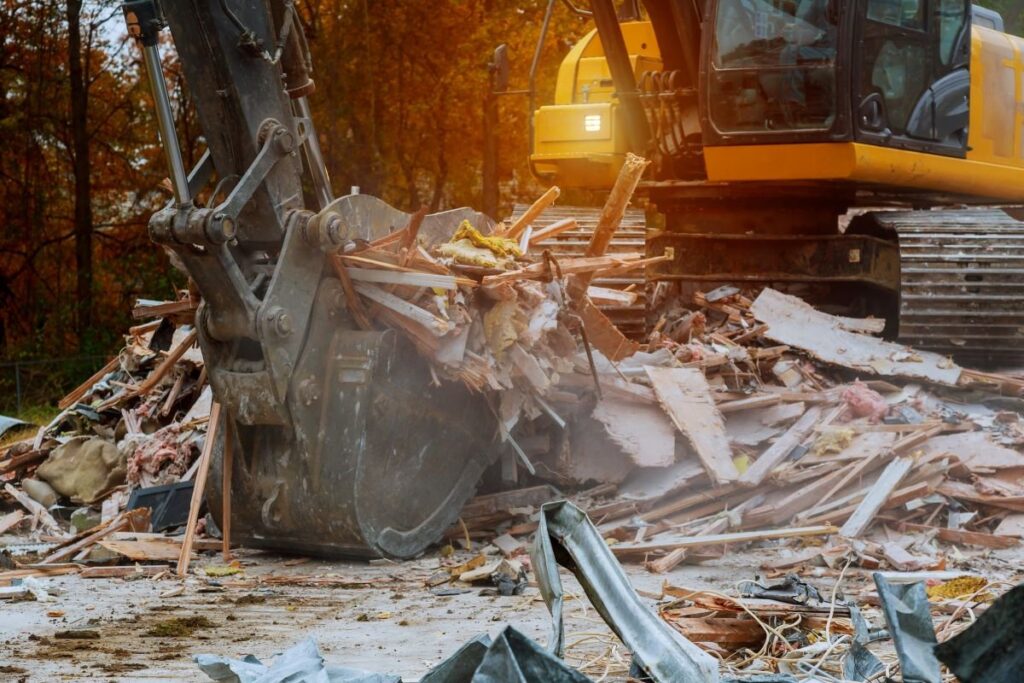When it comes to completely or partially tearing down a building, two terms are often used interchangeably: demolition and deconstruction. Although these two terms are frequently confused, they do not mean the same thing.
In this article, the experts at Excavation Chanthier explain the differences between demolition and deconstruction and what they imply from an environmental and economic perspective.
WHAT IS DEMOLITION?
In Quebec, demolition is the most commonly used method for destroying a building or structure. It has the advantage of being an efficient and fast solution, especially when it is necessary to destroy materials that cannot be reused.
The most common demolition methods involve using heavy equipment, such as excavators, bulldozers, or explosives to knock down a structure. It is most often chosen for dangerous buildings (demolition after a disaster) or those that need to be replaced quickly.
Demolition is a serious matter that involves a careful and controlled process to ensure everyone’s safety. To learn more about this topic, check out our article “Demolition safety measures to follow for a demolition project.”
WHAT IS DECONSTRUCTION?
Deconstruction is a meticulous and more environmentally friendly process that aligns with a construction waste recovery approach on a construction site.
More specifically, deconstruction involves dismantling a building or structure to recover materials at the source and redirecting them to appropriate facilities for transformation, such as sorting centers.
These materials are then reused or recycled.
Here are the main materials that can be recovered on a construction site:
- Brick
- Shingle
- Concrete
- Metals
- Wood
- Asphalt
- Glass
- Plastic
- Gypsum
The deconstruction of a structure must be carried out by qualified professionals using specific tools and equipment. At Excavation Chanthier, a demolition company in Montreal, all our operations are carefully planned and executed by experts.
DISCOVER OUR DEMOLITION SERVICES
THE 3 MAIN DIFFERENCES BETWEEN DEMOLITION AND DECONSTRUCTION
- Unlike demolition, deconstruction involves sorting materials to collect the valuable elements. This method fits into an ecological and economic approach where the key principles are to recover, reuse, and recycle.
- Deconstruction requires more meticulous procedures aimed at preserving materials. For example, careful organization is needed to sort materials by category directly on the site and avoid contamination between them. The tools and equipment required for deconstruction are also less imposing, allowing for more precise work, but it takes more time.
Additionally, deconstruction often involves a detailed planning phase to identify potential reuse opportunities for recovered materials. This may include consulting with architects, engineers, and material suppliers to determine the best way to repurpose or recycle materials. By carefully planning the deconstruction process, contractors can maximize the amount of material recovered and minimize waste. - The deconstruction process is therefore more demanding than traditional demolition. More labor and time are needed to complete the project. However, the resale of recovered materials can help cover part of the additional expenses. Costs and charges related to transporting and managing waste to landfills can also be reduced.
DEMOLITION OR DECONSTRUCTION: COMPLETE YOUR PROJECTS WITH EXCAVATION CHANTHIER
The decision between demolition and deconstruction depends on the needs and requirements of each project. The demolition of a building may be the best option for damaged structures that contain little or no recoverable materials.
Deconstruction, on the other hand, is part of a more responsible approach to material recovery. However, this process requires more time and labor to be done correctly.
Whether it’s for a deconstruction or demolition project, our experts have the equipment and skills needed to carry out any type of project safely.
Are you in Greater Montreal and looking to undertake demolition or deconstruction work? Contact Excavation Chanthier today to share your project and get a free quote.

